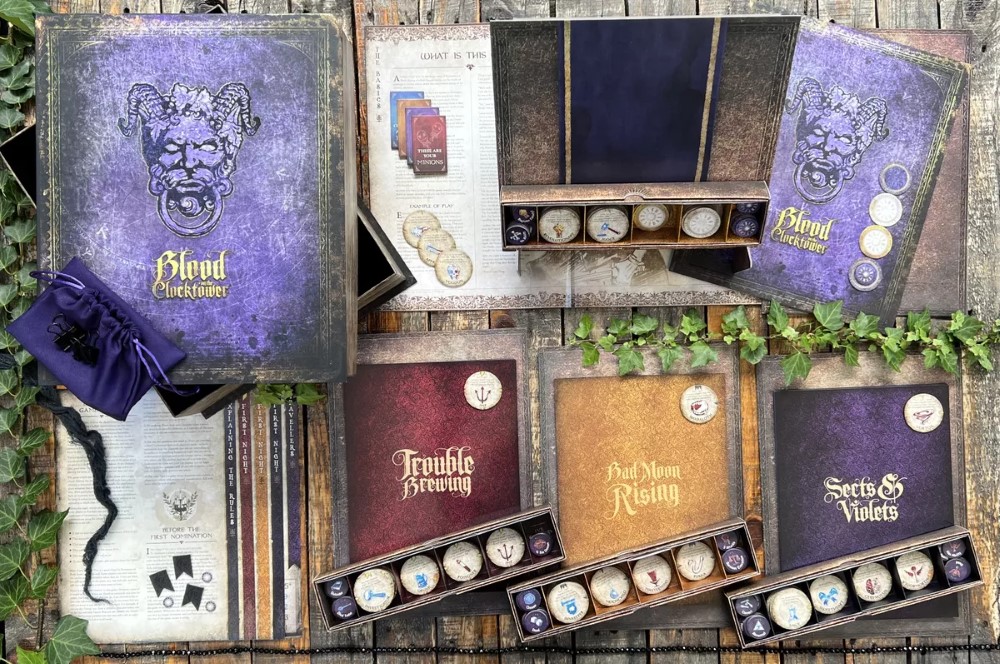Introduction
Blood on the clocktower is a social deduction game released out of Kickstarter in 2022. I discovered it through the No Rolls Barred series, tried it out with some friends and it's immediately become a regular thing. It's not just something you play and then forget about - you play it, and then you keep thinking about the past game and what you could've done better and when you can play again. The design is so well thought out, with each game being a unique scenario of fun interactions between lots of overpowered abilities that somehow mesh together to create a balanced game.
Blood on the clocktower is a game best played with 8-13 players. You don't have to buy the game to play it, however once you have a group and know you'll play it regularly I would highly recommend buying the real thing as it is very high quality (albeit very expensive). If you can get a group of players together, I would highly recommend giving this game a go. No other game has gone from something I know nothing about to a regular thing that I invite loads of people to this quickly. Everyone who's come along has had a great time - give it a shot.
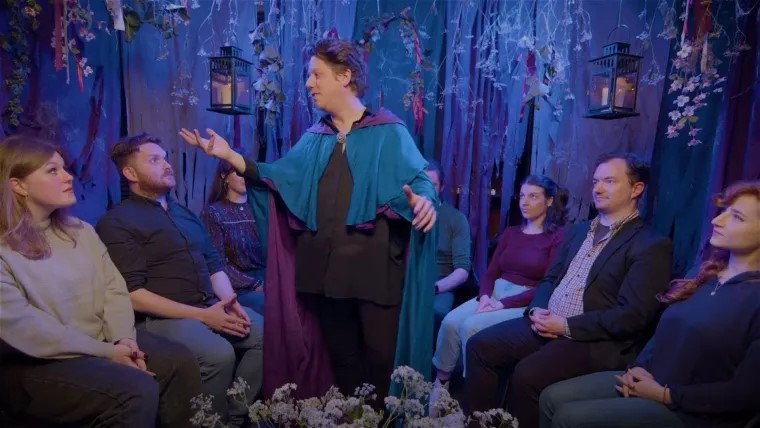
Like Mafia?
The core premise is very similar to mafia/werewolves - there's a good team (an uninformed majority) and an evil team (an informed minority), and the evil team have to try and kill off all the good team while the good team figure out who the evil team are and execute them. Simple!
"But I hate mafia..." - don't leave yet! There's two very key differences which transform the game from an ok game to fill some time to a masterpiece which occupies the whole evening.
Every single person gets a cool ability to influence the game
While in werewolves you're often just a boring villager, in blood on the clocktower you have a cool ability every single time. Even if some might seem boring as first, there's always multiple strategies of how to best use your ability to try and solve the puzzle. Because this is a puzzle, almost more than social deduction. Yes, there is social deduction, but with lots of abilities gaining little bits of information, it often becomes quite a complex puzzle to use your abilities to figure out who is telling the truth and who is lying (or telling the truth, but their information is still wrong - more on that later!).
Dead players still talk and receive one more vote
Player elimination sucks. Nobody wants to be killed on the first day then have to spend half an hour watching everyone else have fun. In blood on the clocktower, you don't! Instead of being totally eliminated, you lose your ability plus you only get one last vote for the rest of the game. This sounds fairly meaningless, but on the final day it's typically down to the dead players to decide who they think is the demon, as there's only 3 alive but could be around 10 dead players.
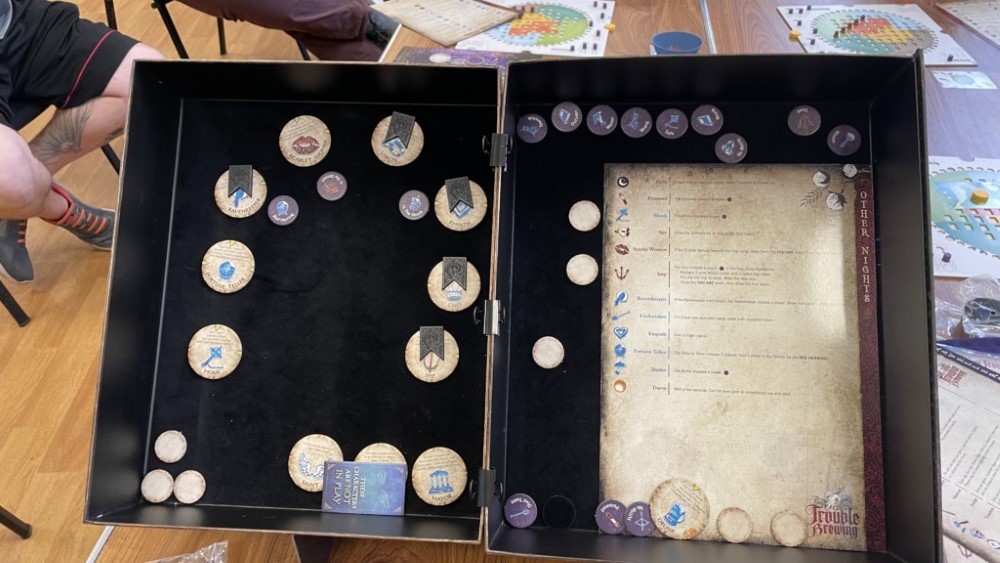
The Storyteller
For mafia, one player essentially has to decide not to play the game and facilitate the game's actions. This is fine, although not ideal. In blood on the clocktower, this player is the storyteller. So what's the difference? Instead of simply facilitating deterministic actions, the storyteller has choices to make. An ability might say "you start knowing 1 of 2 players is a particular character". The storyteller is the one who gets to choose which players and which character are shown to this player to create the most engaging game possible. Maybe you want to show them an information role, so the town can trust their information. Maybe you want to show them a passive ability so that the town knows it is in play. Maybe you want to show one good and one evil player to allow the evil player to bluff it, or maybe you want to show both good players so the good team can figure out who it is. Or maybe you want to show the spy, a role which can appear as any character to other abilities.
The Storyteller is a key part of making the game fun, and can actually be the most rewarding role of all. Also, the Storyteller has the power to subtley nudge the game towards an exciting conclusion. Never too much that the wins feel undeserved, but just enough to keep the game exciting and balanced.
The only caveat is that being the storyteller does require good knowledge of the game, however it's something you can learn over time and the introductory script, Trouble Brewing, is particularly easy for the storyteller to run. When running more advanced scripts, the game is only as good as the storyteller running it and they can be more complicated to run so new storytellers should always start with Trouble Brewing. If you check out the alamnacs/wiki, quizzes on the website and watch a couple of example games to understand how it works you'll be a great storyteller.
You lied to me!
Drunkeness and poisoning is the heart and soul of blood on the clocktower. Usually, there's 2 options: you're on the good team, or you're lying. In blood on the clocktower, there is a third option.
If you are drunk or poisoned, your ability does not work. If your ability tries to alter the game state, it will do nothing. If you protected someone, they may still die tonight. If you use your ability to try and shoot the demon, they won't die. But crucially, if your ability gathers information, you will still be given information, but it will be misleading and probably false. Maybe your ability told you that 1 of your neighbours is evil? You might just be drunk and they're both actually good. You've learnt that 1 of 2 players is the demon? You might just be poisoned. This adds so much to the game as you can't even trust yourself - leading what would sometimes be an easy puzzle to become something that's always got more possibilities than it might seem. Drunkeness and poisoning allow for character abilities to be strong without being overpowered as you can never quite trust anything, and simply the potential of this being the case makes the puzzle far more interesting.
You may be wondering "well if my information can be made up, what can I trust?", and the answer is still "most of it". In Trouble Brewing, there is 1 good character that can lead to drunkeness and 1 evil character that can cause poisoning. This means once you've found the drunk you know that everyone else's information is correct! There's also very specific counts for each type of character, meaning if you've already got an outsider then you probably haven't got a drunk (or maybe you have and an evil player is pretending to be an outsider to make you think that your information is correct when actually it's nonsense and they're the evil player sitting next to you who you have thought is good for the whole game...). The puzzle isn't just about finding out who is lying, it's about finding out who's information is actually correct in the first place. Also, some players, even though they are on the good team, have an incentive to lie also! So you can never really know anything for sure until you get to the end of the game when you can piece everything together and (hopefully) solve the puzzle.
The Official Scripts
A script is a sheet containing potential characters that can be in play. The game comes with 3 scripts right now, each offering a different way of playing the game. There are more in development although it is not clear when these will be released.
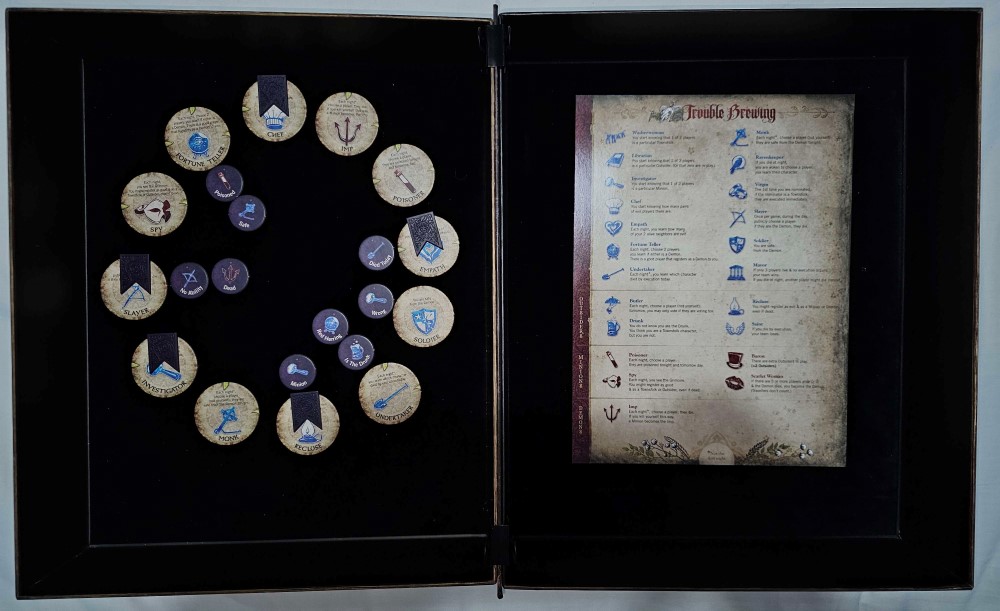
Trouble Brewing [Link]
Trouble Brewing is the simplest of the three scripts, and the only one you should consider playing if you are new to the game. While it's often regarded as a bit of a "tutorial script" as it's fairly easy to understand, Trouble Brewing is simply a masterpiece and never fails to lead to interesting games for new and experienced players alike. The balancing is almost exactly 50/50 meaning you always feel like you have a fair chance of winning and the mechanics are so simply explained but all come together to lead to lots of possibilities for both the good and evil team.
Trouble Brewing does exactly what it sets out to do - it teaches all the core mechanics of the game. Some players will want to reveal their character and share their information. Some characters will want to stay secret so they don't get killed by the demon. Some characters might even want to die, so might try to lie about who they are to trick the demon! Some characters will want to kill certain players because they gain more information when they do - meaning it's not uncommon for people to nominate themselves even if they know they're good, if the town thinks they will learn more information as a result. The evil team is full of powerful abilities that can spread misinformation but also get themselves out of trouble if they think the good team are onto them! It's all around a masterpiece in script design that perfectly achieves its goal.
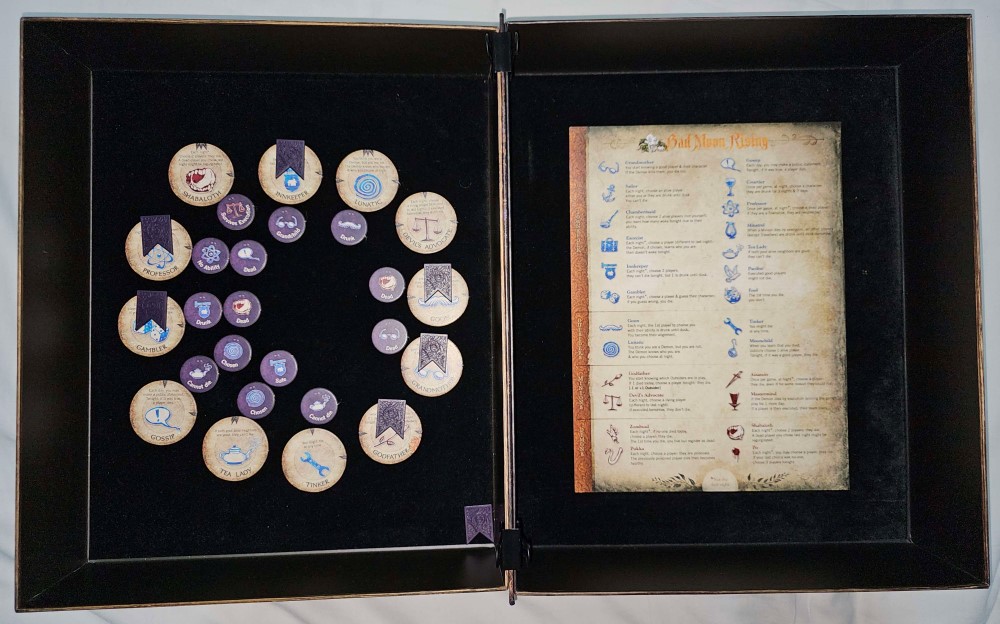
Bad Moon Rising [Link]
However, Trouble Brewing can start to get boring if you play it a lot and you'll miss the most exciting parts of the game. Bad Moon Rising is my least favourite script however it's a really cool script that plays very differently from others.
Bad Moon Rising is a very chaotic script. You can easily wake up to find 4 deaths in the night, gain powerful information or even be resurrected from the dead. However, you can't just sit around and wait for the information to come to you. In Bad Moon Rising, you have to purposefully make bold plays to gain information or you'll be slowly (or, well, very quickly) devoured by the very powerful evil team. You might have to risk your own life (or someone else's) to gain information, but the information you can get is absurdly powerful. There are 4 types of demon, each which kill a different number of players per night so you'll have no hope of solving the game unless you figure out which type of demon it is - before it's too late!
Generally, players who prefer the social aspect of the game, aren't afraid to make big plays and enjoy chaos will enjoy this script
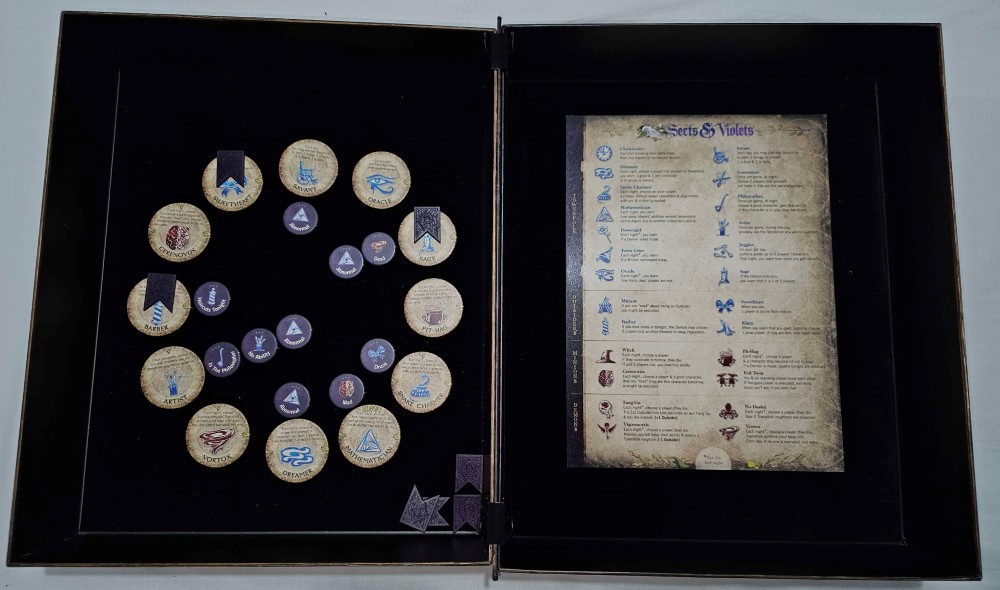
Sects & Violets [Link]
Sects & Violets is my personal favourite. In Sects & Violets, the good team are overwhelmed with extremely powerful information but the evil team have lots of ways of making it false. The good team has to figure out which information is correct and which information is incorrect to have any hope of solving the complex puzzle. Players can change characters & even which team they're playing for. Characters can force players to lie about who they are to the rest of the group. There's even a demon that makes all of the information completely false. There's plenty of reasons for the good team to lie about who they are, so figuring out anything at all can be difficult but with the sheer amount of powerful information granted to the good team, it's not as impossible as it might initially seem.
Experimental Characters
You know how I said the evil team have a minority? You know how the demon kills each night? You know how there is an evil team? Well, not necessarily...
The Experimental Characters are really where this game shines. My favourite games are ones that let you "break the game" - maybe there's a combination of cards that's just absurdly powerful? Or a new rule that says "add 1 to every number". This kind of thing is so fun and blood on the clocktower has a huge number of characters which flip the game on its head. The legion is a demon where the evil team have a majority, but if they don't convince a good player to vote then the vote won't be counted. The leviathan is a demon that doesn't kill each night, and instead wins automatically after 5 days. The athiest is a townsfolk that means there isn't actually an evil team - the storyteller has just been making it up all along! These characters are the most fun in the game and really showcase what you can achieve with a well designed core ruleset. These characters will eventually make it to official editions, which will all play in completely different ways to each other, keeping the game feeling fresh and interesting.
You can also make completely custom homebrew scripts! This is a super fun process as you try to break the game in the most balanced way possible. Here's my in the night garden script [v1.3]
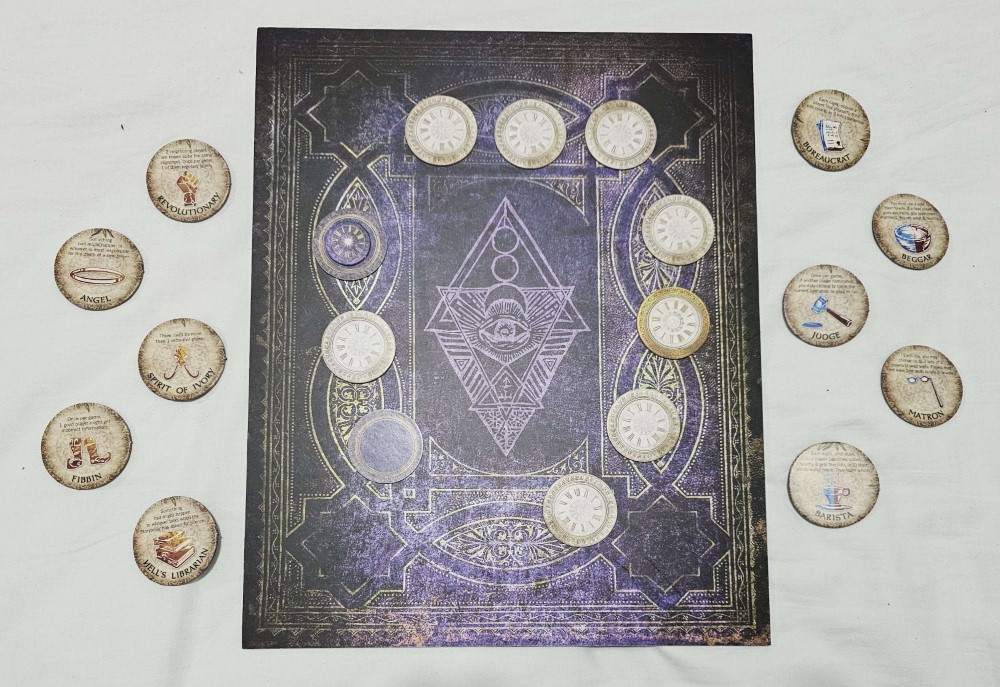
Travellers & Fabled
Travellers and fabled perfectly illustrate how well this game has been thought out. Have someone turn up 10 minutes into your 90 minute game? No problem - they can join as a traveller! Someone needs to leave after half an hour? Also make them a traveller! Are new players getting targetted? Use a fabled. Does someone have an intellectual ability that would prevent them from playing the game? Use a fabled character.
Blood on the clocktower is an in person game and the fact that this is all baked into the design of the game just shows how well thought out the whole game is. No, the game is not for everyone, but it's certainly not far off.
Weaknesses
There are a few major drawbacks of blood on the clocktower in my opinion which can make it hard to play the game. However, notice that these only concern whether or not you are able to play. If you do manage to find enough people and enough time, you'll have a great time.
1. You need a big group
While you can do 5 or 6 player "Teensyville" games, for the full experience you need at least 7 players, preferably 10. Getting a big group of people that are all available at the same time can be tough.
2. It takes a long time
This isn't a game that you can show up at a board games night with. This is the board games night. Games generally last an hour to 90 minutes, meaning I generally play 2 or 3 back to back. The time flies by, but it's worth noting that it's board games night or blood on the clocktower night, not both. This isn't your average board game.
3. It can take a while to understand
Blood on the clocktower is great on your first game, but better on the second. The best parts of blood on the clocktower are the really complicated scripts, but you really need to play trouble brewing beforehand to understand the game otherwise they won't make sense. This also applies for the storyteller - you need to have a thorough understanding of the game to run it.
4. The box is really big
It's a nightmare to carry anywhere!
Conclusion
Blood on the clocktower is a superbly designed social deduction game and the best I have ever played. With a huge number of powerful abilities that synergise with each other, every game is unique and always fun. Since discovering this game I now play regularly with lots of different people who almost always have a great time and come back again! You won't just think about this game when playing it, you'll be always thinking about the past game when you won because they did X or this player won because they did Y. If you have the group size and the time, you can't miss out on this game.
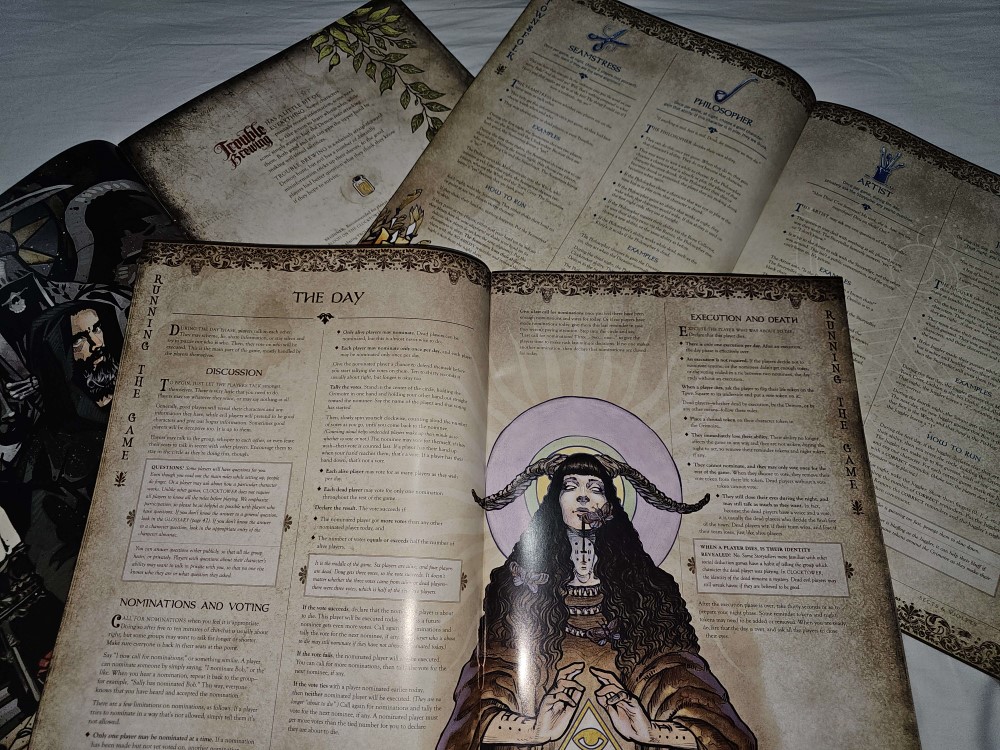
A Discussion by Steven Medway
I'd like to finish with an extract from Steven Medway discussing the balancing of the game as it's interesting to hear the design philosophy from the creator themselves:
"My approach with Clocktower was to move completely away from the "+1, -1" design philosophy, and instead create characters that were wildly, qualitatively different. Even completely unfair. Instead of creating a character and thinking "Oh wow. THAT is unfair, better not," I let the character stay as is, and created MORE unfair characters on the opposing team. For example, the Empath is unfair. Knowing that both your neighbors are good is very unfair. Knowing both your neighbors are evil is INCREDIBLY unfair! So... I created the Poisoner. Holy heck, the Poisoner is unfair. Making someone's information false, without them knowing? Every night? That is crazy-unfair. The Saint is unfair. You lose the game if nobody trusts you. Ouch, that's unfair. The Librarian is unfair... you know who the Saint is, so you know not to execute them, and they trust you in return. The Fortune Teller is unfair. Knowing which player is the Demon is everything you need to know to win (particularly if the red herring is dead). So, the Imp is unfair by changing players as soon as the Fortune Teller is onto them.
The design philosophy of Clocktower was not to create a fair game, in the sense that the abilities of one team could be weighed against the abilities of the other. The design philosophy was to create a game where every player has an ability that is very powerful, even to the point of unfairness, but that the opposing team also has abilities approaching the overpowered. This way, maximum agency is given to the players. The abilities don't win the game. The players don't win the game. The players win the game by using their abilities well. As you can imagine, this approach means that balancing things is incredibly difficult, takes a long time, and can only be achieved by a personal judgement on what is balanced and what isn't, because it cannot be judged by mathematical analysis.
What this does mean, though, is that due to player skill or blind luck, it sometimes seems that a game can be won or lost due to a character ability. It is usually not a single character or player that won, but a hidden web of interaction that resulted in a single player taking the lead. For example, whilst a Demon player may complain that they lost due to the Slayer "being overpowered" because they won the game on day two and the Demon did "nothing wrong," what that player is missing is that the Slayer talked to the Washerwoman and Librarian to learn who not to target, got protection from the Monk, bluffed as the Ravenkeeper, and convinced the Poisoner to poison the Fortune Teller and not the Slayer. The Slayer worked for their victory, and won fairly, even though it seems like the character, and therefore the game, is unbalanced."
Overpowered-in-a-balanced-kind-of-way is a great way of describing how blood on the clocktower works and manages to create such engaging but somehow balanced games. How this was done is simply amazing.
Other Videos
No Rolls Barred
I would highly recommend watching the No Rolls Barred series as they are really high production quality and very entertaining. It might even persuade you to play the game yourself!
Shut Up & Sit Down
If you're not yet persuaded, here's another review!




